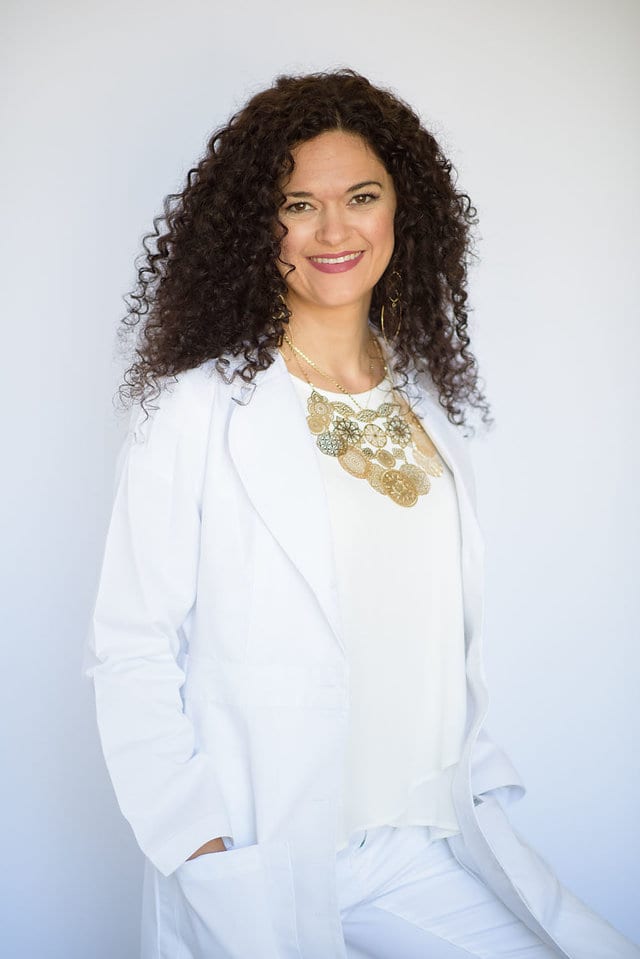Dr. Jolene Brighten is a leading expert in Post-Birth Control Syndrome and hormonal birth control related problems. She is a women’s health naturopathic medical doctor, practicing physician, author, and speaker. Her upcoming book Beyond the Pill is a deep dive into how birth control pills can negatively affect many women, including step-by-step information on how to come off of hormonal birth control and start feeling like yourself once more.
Recently, we had the opportunity to chat with Dr. Brighten about why so many women experience negative health effects while on the pill and why owning your own fertility should be an empowering experience.
Many medical professionals treat women as if we are walking baby-making factories, and scare us into believing that we can get pregnant at any time. What’s the truth about fertility? Are we really fertile all month long?
Us gals are only fertile about one day out of every month. It’s that tricky sperm that can live five days or more that extends our fertile window in the month.
How many women are currently on the pill? Are these women primarily using it to prevent pregnancy?
Recent estimates state that over 100 million women worldwide are on the pill and over 11 million of them are in the United States. The primary stated reason for using hormonal birth control according to studies is for symptom management, not pregnancy prevention. Although the ability to prevent pregnancy while also suppressing symptoms is an added bonus.
Why does modern medicine promote the use of the pill to “fix” other hormonal issues unrelated to preventing pregnancy?
Let’s start with this—your doctor absolutely wants to help you and no one gives up a decade of their life to become a doctor without truly wanting to help. But somewhere in their education, the root cause practice in women’s medicine fell the wayside and hormonal birth control became the solution to every period problem. It’s like “the pill for every female ill” dilemma.
Learning more about our fertility should be empowering, but much of the language surrounding how to track your fertility signs describes it as something unsavory or something that we just have to grin and bear because its “gross”. How can women learn to not fear their natural fertility signs while getting in touch with their bodies?
Your body is amazing. You have the ability to create an entirely new life form in your body because of what it can do. Let’s all take a minute to respect that bit about a woman’s body. Because for some reason, some humans forgot that this is how the whole entire species got here.
You cycle with the moon, you’re connected to a cosmic rhythm, and those cyclical hormones give you superpowers when they are in balance. There’s this narrative that has been going around for far too long that the natural process of the female body is something we should be ashamed of. I fell into that story too and spent years hating my body and putting it into submission with birth control. Yes, I spent a few years skipping periods because I could. And I’ve met with so many patients who have shared a similar journey.
Your body provides you data every single day. Data you can leverage to understand where your health currently is. Slippery egg white secretions aren’t gross. They are a sign of vitality, of hormones orchestrating the incredible event of ovulation, and your body preparing to create progesterone, which helps you feel more relaxed, assertive and you seriously start thinking in much more creative ways.
What are some of the issues the pill can cause that women aren’t told about?
This is a big question and why I had to write an entire book about it. Because if we know the issues it can cause then we can make an informed decision and support our health if we choose to take it, which is every woman’s right.
Often, we aren’t told about the nutrient depletions, impact on our gut, how it does raise the risk of certain cancers, or how there are labs that we can use to screen for potential side effects like Factor V Leiden and MTHFR. We are also not told that it can trigger autoimmunity in some women or that there is an association with mood symptoms.
Do these issues just go away if a woman stops birth control?
I wish all these issues just went away when we stopped. But there are several that like to linger with us and new ones that can crop up when we do ditch the pill for good. For example, the genetic alterations in the liver that the pill can cause don’t just go away. In fact, research has concluded that they never return to the pre-pill state. I think that is more the norm if you do nothing because clinically, I have found that with diet and lifestyle interventions women can reverse these effects. And the reality is, you are going to have to put in some work to undo what the pill has done.
Many women are unaware that birth control can affect their libido. Can women experiencing a decreased libido as a result of birth control get it back?
You can get your libido back, but in my clinical experience, it will not come back until you discontinue birth control.
Your upcoming book Beyond The Pill shows readers how to regain balance of their hormones after coming off of birth control. What are some of the signs and symptoms of post-birth control syndrome?
Post-birth control syndrome (PBCS) can be the return of symptoms before birth control or the onset of new symptoms. It typically presents four to six months after stopping birth control, but can certainly come on sooner or later. Symptoms can range from amenorrhea (missing period) to frequent periods, acne, digestive issues, brain fog, fatigue, mood symptoms, and headaches.
What is one thing women can start doing today to take back control of their fertility and hormones if they’re on birth control or have ever been? What is the first step women can take to begin learning about their menstrual cycles?
Tracking your menstrual cycle is an excellent place to start. I teach you this in Beyond the Pill and what your symptoms mean depending on where they fall within your cycle. You definitely want to begin supporting your liver as it is involved in detoxifying everything that your body encounters, including synthetic hormones and from the research we understand that there are structural and genetic changes that occur while on hormonal birth control. Another area to focus is on building a nutrient dense diet to replenish nutrient stores.
Beyond The Pill includes grocery shopping lists, a recipe guide, and a household cleaning products guide. Why are nutrition, supplementation, and removing toxins so important to hormonal health?
What you eat and absorb you become. Your nutrition is the foundation of building healthy hormones and moving them out of your body. Environmental toxins known as xenoestrogens can mimic your natural estrogen and cause imbalances in hormones. Supporting your body’s natural detox pathways as I outline in the ‘Birth Control Hormone Detox 101’ and ‘Gut Check’ chapters of Beyond the Pill are essential to hormone health. Supplements can help build upon diet and lifestyle therapies to enhance hormone function and balance.
Where can our readers learn more?
My website is my main hub where I have articles, resources, physician grade supplements, and more. You can find me on Facebook, Twitter, and Instagram. If you’ve grabbed a copy of Beyond the Pill then I invite you to get the gratitude gifts we’ve built to go along with it at www.beyondthepillbook.com.

